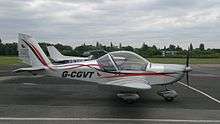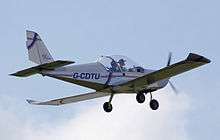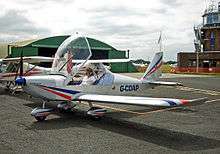Evektor SportStar
The SportStar and EuroStar are a family of a two-seat, light sport aircraft (LSA), manufactured by Evektor-Aerotechnik of the Czech Republic and powered by a Rotax 912ULS, 100 horsepower (75 kW) engine.[1][2]
| SportStar | |
|---|---|
.jpg) | |
| SportStar | |
| Role | Light Sport Aircraft |
| National origin | Czech Republic |
| Manufacturer | Evektor-Aerotechnik |
| Variants | Evektor EPOS |



The SportStar was the first approved special light-sport aircraft (S-LSA) and was named "S-LSA Aircraft of the Year" by AeroNews Network.[1]
Design and development
The SportStar is an all-metal design made from anodized, corrosion-proofed aluminum. The airframe uses a pop-riveted and bonded construction, which the company claims will improve fatigue characteristics and result in a longer service life. The company also claims this construction technique results in better crashworthiness, the elimination of rivet zippering in an accident and quieter in-flight noise levels due to the elimination of oil-canning and flexing.[3]
The SportStar was designed for towing sailplanes up to 1544 lbs (700 kg) gross weight and for towing banners up to 1479 sq ft (140 m2).[4]
Variants
- EuroStar SL
- Model for the European ultralight category, with a gross weight of 1,041 lb (472 kg)[2][5]
- EuroStar SL+
- Version of the EuroStar SL with a new wing and integral fuel tanks, bigger baggage compartment and lower empty weight by 8 kg (18 lb).[6]
- EuroStar SLW
- Model for the European ultralight category, with a gross weight of 1,041 lb (472 kg). It combines the EuroStar fuselage with the wing and stabilizer from the Harmony.[6][7]
- Harmony
- Model for the US LSA market, based on the Harmony airframe, with enlarged ailerons and rudder to improve crosswind capabilities, an improved wing, winglets and tail, wider and longer cockpit, as well as refined wheel pants and other fairings.[2][6]
- SportStar
- Initial model
- SportStar SL
- Improved model
- SportStar Max
- Version for the US LSA market with a gross weight of 1,320 lb (599 kg)[1][2]
- SportStar RTC
- SportStar RTC was developed to meet EASA VLA certification and intended for use in flight training.[8]
- Evektor EPOS
- Electric aircraft version, using the SportStar RTC fuselage and a new wing design.[6]
Specifications (SportStar Max)
Data from Jane's All the World's Aircraft 2010-11[9]
General characteristics
- Crew: one
- Capacity: one passenger
- Length: 5.98 m (19 ft 7 in)
- Wingspan: 8.645 m (28 ft 4 in)
- Height: 2.475 m (8 ft 1 in)
- Airfoil: NACA 2315 mod[10]
- Empty weight: 309 kg (681 lb)
- Max takeoff weight: 600 kg (1,323 lb)
- Fuel capacity: 118 l (31 US gal; 26 imp gal) usable / 85 kg (187 lb) max fuel weight
- Powerplant: 1 × Rotax 912ULS 4-cylinder air-cooled horizontally-opposed piston engine, 73.4 kW (98.4 hp)
- Propellers: 3-bladed VZLU V230C ground adjustable propeller[11]
Performance
- Maximum speed: 213 km/h (132 mph, 115 kn)
- Cruise speed: 204 km/h (127 mph, 110 kn) at 75% power
- Stall speed: 83 km/h (52 mph, 45 kn) power off flaps up
- Never exceed speed: 270 km/h (170 mph, 150 kn)
- Range: 1,300 km (810 mi, 700 nmi) with max fuel
- Endurance: 8 hours 30 minutes
- Service ceiling: 4,720 m (15,490 ft)
- g limits: +6/-3
- Rate of climb: 5.2 m/s (1,020 ft/min)
- Power/mass: 0.128 kW/kg (0.078 hp/lb)
- Take-off run: 190 m (623 ft)
- Take-off distance to 15 m (49 ft): 365 m (1,198 ft)[11]
- Landing run: 180 m (591 ft)
Avionics
- Garmin G3X fit
- 10.6" PFD - Primary Flight Display (GDU 460)
- 10.6" MFD - Multi Function Display (GDU 460)
- 2 ADAHRS - Air Data and Attitude and Heading Reference System (GSU 25)
- Magnetometer (GMU 22)
- EMS (GEA 24)
- OAT sensor (GTP 59)
- GPS antenas, Synthetic Vision, backup battery
- Back-up Air speed indicator + Altimeter (dia 2 ¼")
- COMM Garmin GTR225A + Transponder GTX328 (mode S) + ACK A-30
- Compass SIRS
References
| Wikimedia Commons has media related to Evektor Sportstar. |
- Evektor, spol. s r.o. (n.d.). "SportStar Max Overview". Retrieved 4 November 2011.
- Bayerl, Robby; Martin Berkemeier; et al: World Directory of Leisure Aviation 2011-12, pages 47-48. WDLA UK, Lancaster UK, 2011. ISSN 1368-485X
- Evektor-Aerotechnik. "Advanced Airframe with Long Service Life". Retrieved 5 November 2011.
- Evektor-Aerotechnik (n.d.). "Glider Towing". Retrieved 4 November 2011.
- Evektor (n.d.). "EuroStar SL". Retrieved 4 November 2011.
- Tacke, Willi; Marino Boric; et al: World Directory of Light Aviation 2015-16, pages 48-50. Flying Pages Europe SARL, 2015. ISSN 1368-485X
- Evektor (n.d.). "EuroStar SLW". Archived from the original on 31 October 2011. Retrieved 4 November 2011.
- "SportStar RTC". evektor.com. Retrieved 5 October 2015.
- Jackson, Paul, ed. (2010). Jane's All the World's Aircraft 2010-11 (101st ed.). London: Jane's Information Group. pp. 165–166. ISBN 978-0710629166.
- Lednicer, David. "The Incomplete Guide to Airfoil Usage". m-selig.ae.illinois.edu. Retrieved 16 April 2019.
- "Technical Data". Evektor. 2020. Retrieved 2011-11-05.